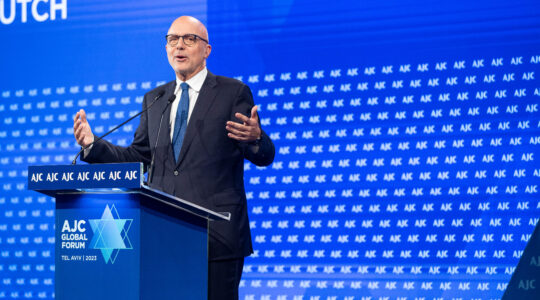BEERSHEVA, Israel (JTA) – It was called the “last great cavalry charge in history.”
Ninety years ago, a pivotal World War I battle in the flatlands of the Negev Desert helped pave the way for the creation of the Jewish state thanks to a death-defying charge by a contingent of battle-weary Australian soldiers.
After British troops had tried unsuccessfully for two days to outgun Turkish troops, 800 Australians of the Light Horse Brigade, whose horses had not drunk in 48 hours, were ordered on Oct. 31, 1917 to ride into the firing line of 4,000 entrenched Turks armed to the teeth.
Their slouch hats adorned with emu feathers, the Australians galloped across the three-mile desert at sunset. By nightfall they had managed to achieve what some 50,000 British soldiers could not, routing the Turks at Beersheva.
The Gaza Strip fell one week later, Jerusalem was captured the following month and eventually Damascus was taken, precipitating the fall of the Ottoman Empire, the start of the British Mandate and, ultimately, the creation of the Jewish state.
Thirty-one Australians were killed in the fateful battle.
On Monday, a memorial to those Australian soldiers was unveiled by Israeli President Shimon Peres and Australian Govenor-General Michael Jeffery. The bronze sculpture features a mounted soldier in full flight leaping over the Turkish trenches to capture the biblical city’s all-important wells.
The sculpture is the centerpiece of the Park of the Australian Soldier in this southern Israeli city, a $3 million park built by the Melbourne-based philanthropic foundation of Richard and Jeanne Pratt.
The Battle for Beersheva was “audacious in concept, skillful and courageous in execution,” said Jeffery, who this week became the first Australian head of state to visit Israel while in office.
On his weeklong state, Jeffery visit also met with Israeli Prime Minister Ehud Olmert and Foreign Minister Tzipi Livni.
About 1,000 people, many of them descendants of the Australian Light Horse Brigade, attended the sculpture’s unveiling. The biggest applause went to a representative of the Turkish Embassy who was invited to lay a wreath. New Zealand soldiers also performed a traditional Maori haka dance.
“This is where the gallant 800 changed the history of the Middle East,” said Sam Lipski, the Pratt Foundation’s chief executive.
Aside from helping turn the tide of the war, the legendary cavalry charge took place on the same day as Britain’s war cabinet signed off on the Balfour Declaration – the first time a world power had backed the creation of a Jewish homeland.
Two days later, on Nov. 2, 1917, British Foreign Secretary Arthur Balfour formally sent the declaration to Lord Rothschild.
“What would have happened to our country and our history if this did not take place?” Peres said of the cavalry charge. “The distance between Australia and Israel is far geographically, but morally we are very close.”
The Park of the Australian Soldier tells the story of how Australians have fought in the Middle East – in two world wars and other conflicts, including the invasion of Iraq in 2003, when Australia’s elite forces neutralized Saddam Hussein’s Scud missiles that were aimed at Israel, Lipski said.
“It is a story of how in the past 90 years Australian soldiers have come to this land to fight, defend, sacrifice and help make peace,” he said.
Monday also saw the opening of the Jewish National Fund’s Anzac Trail, which traces the route taken by Australian and New Zealand troops from Beersheva to Gaza.
Earlier in the day, a group of descendants of the Light Horse Brigade visited the site of the battlefield.
“It’s all so emotional to think we are here 90 years later,” said a tearful Brian Cantwell, 68, whose father, Jack, was a sergeant in the charge “This was an Australian-led victory.”
“I’m very emotional,” said Lorna Bourchier, 82, whose uncle, Murray Bourchier, was a commander of the charge. “I feel proud that somebody who was part of our family helped turn a page in the history of Israel.”
JTA has documented Jewish history in real-time for over a century. Keep our journalism strong by joining us in supporting independent, award-winning reporting.





